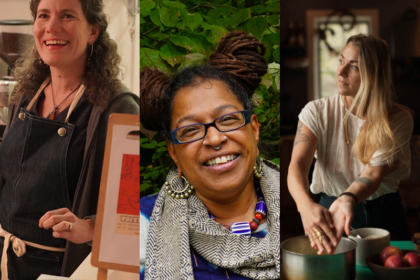
The Covid-19 lockdown spurred aspiring home chefs around the world to try fermenting for the first time. DIY classes moved virtual and countertops filled with bubbling crocks of kimchi, sauerkraut, kombucha and sourdough. Fermentation was one of the top pandemic hobbies.
For professional fermentation educators, this trend brought new, eager faces to classes. But now, as lockdown restrictions have eased, are people still wanting to experiment making their own microbe-rich food?
We asked three experts to share their thoughts on the current state of fermentation education — author and educator Kirsten Shockey (of The Fermentation School and Ferment Works), writer and educator Soirée-Leone (who can be found via her website) and chef, food scientist and fermentation educator Jori Jayne Emde (of Lady Jayne’s Alchemy and The Fermentation School). [Shockey and Soirée-Leone are both members of TFA’s Advisory Board.]
The question: What is the current state of fermentation education?
Kirsten Shockey, author and educator
Fermentation education is exploding. The time has never been better. The interest in fermentation — both as a topic and in hands-on engagement — keeps gaining momentum. People are both more curious and more confused than I have seen in the past. I think part of that is because with the boom of interest a lot of people are coming forward as experts sharing content without the prerequisites to inform accurately. For example, we see misinformation about the subtle differences in fermentation vs. culturing vs. pickling that end up leaving people who are just dipping their toes in the process a little less unsure. When these folx do engage with true experts they are enthusiastic students who enjoy soaking up all that they can and we see their anxieties dissipate. I speak from the experience of working with solid experts and their students through The Fermentation School. It has been beyond gratifying to work with an amazing group of really talented fermentation educators to grow quality online education and a dedicated “help” community through The Fermentation School. In my other educator hat, as an author, it is less clear to me how that media is working for education, but that is a bigger issue in that the publishing world itself is in a lot of flux.
Soirée-Leone, writer and educator
Folks are connecting with familial, cultural, and traditional roots through fermentation. They are building online communities to share knowledge, taking workshops, participating in residencies, checking books out from libraries, and attending fermentation festivals that are popping up all over the world.
While there is an abundance of information available through books and websites, some folks seek to connect in person through workshops. I find that it’s especially dynamic to teach and learn in collaborative environments to share skills and experiences. There are so many traditions, techniques, and riffs. It is exciting to learn about folks’ travels, study, and experiments — we each have a different fermentation journey and something to teach and learn.
Today is a far cry from when I first started cheesemaking in 1991 with one slim book that sang the praises of junket rennet. Now there are books sharing natural cheesemaking techniques, bloggers happy to answer questions, travelers bringing information home and sharing online, and workshops to attend.
Fermentation is accessible with rudimentary kitchen equipment and improvised incubators and cheese caves. Fermentation is empowering and engaging of all our senses—and learning new things about fermentation is a never-ending journey.
Jori Jayne Emde, chef, food scientist, fermentation educator
My perspective on this is it’s booming! There was a huge burst of interest for online learning during the pandemic, and I have not seen that slow down much. Fermentation is a trendy topic and word with, unfortunately, a tremendous amount of misinformation floating around out there. It’s an important time as an educator to really remain engaged with students, as well as capturing fermentation aspirants, guiding them towards proper and well informed education taught by experts in the field of fermentation and health.
